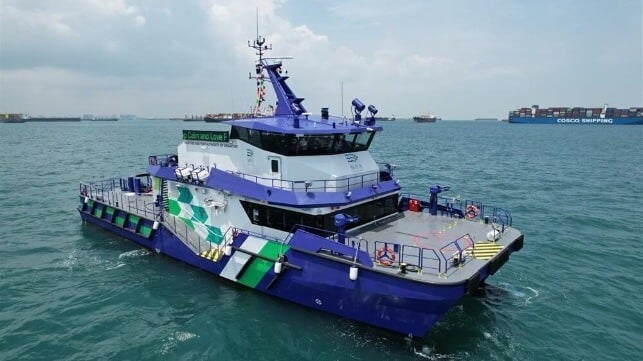Singapore Wants to Buy a Battery-Electric, Autonomous Patrol Craft

Singapore has unveiled a project to build a one-of-a-kind electric patrol craft (e-PC), a development that is part of efforts to decarbonize and digitalize operations. The country is implementing projects to ensure that by 2030, all new harbor crafts operating in its territorial waters are fully electric, capable of using B100 biofuel or compatible with clean fuels such as hydrogen.
The Maritime and Port Authority of Singapore (MPA) has issued an expression of interest for the design and development of an electric patrol craft for efficient operation in its rivers and territorial sea areas. Among other things, the craft will be used for patrols, surveillance, personnel transfers, boarding operations and search and rescue. It will also be deployed for oil/chemical spill control, small craft firefighting, transferring injured casualties and towing and pushing of small craft.
The 17-meter craft will have space for 12 crew members, a cruising speed of 25 knots for 2 hours, and an operational speed of 10 knots for 10 hours for routine operations. The craft is expected to be completed in the first quarter of 2028. MPA expects the e-PC to be revolutionary in terms of safety, good sea keeping, maneuverability, energy efficiency, stability and survivability, in addition to its zero-emissions propulsion.
The port authority also wants the craft to have autonomous and digital capabilities, including remote operation from shore-based control centers and advanced collision detection systems. In terms of the hull, MPA's RFP asks for a proven or derived hull form design with low hull resistance to minimize the required power.

that matters most
Get the latest maritime news delivered to your inbox daily.
Singapore consistently ranks as the world's leading maritime city, based on port traffic and its diversified ecosystem of maritime enterprises. It is also a leader in green shipping initiatives, particularly its incentives for zero-carbon vessels and support for R&D programs.
Last year, the country achieved a major milestone after annual vessel arrival tonnage crossed the three billion gross tonnage mark. Singapore also remains as the world’s busiest transshipment hub, with a total container throughput of 39 million TEU.
